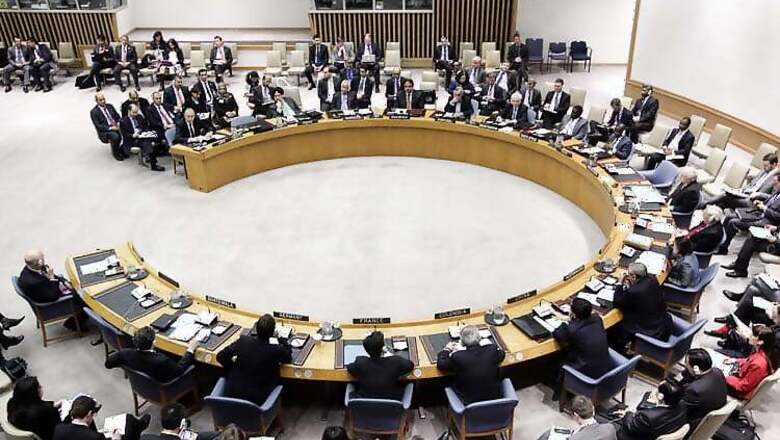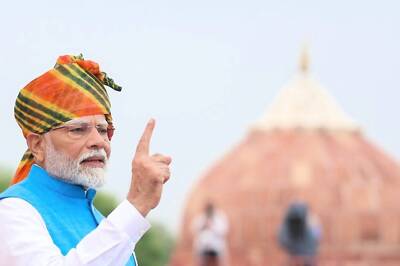
views
United Nations: In a strong criticism of the functioning of the UN Security Council, India has said that the world body's "ineffectiveness" is imposing "severe costs on all of us", as it blamed the UN organ for failing to fight terrorism and use peacekeeping as a tool to secure peace.
India's Permanent Representative to the UN, Ambassador Asoke Mukerji, termed the annual report of the Council "opaque and unaccountable" and called it a "half-way house."
He said the report does not provide an answer to why the primary UN organ responsible for maintaining international peace and security "has allowed the world to slide further down the road to violence and conflict."
"Why have more than 60 million people become the victims of this crisis? Why is the world seeing so many refugees from crisis situations? "We in the General Assembly do not receive any answers to this question. Nor, for that matter, does the general public. The consequence is a severe erosion of the credibility of the Council itself," Mukerji said here yesterday at the General Assembly plenary meeting on the annual report of the Council.
Focusing on the three areas of peacekeeping, the response to terrorism and inability to resolve disputes peacefully, Mukerji said the ineffectiveness of the Council is "imposing severe costs on all of us, especially developing countries."
"Going by its report, the Council seems unable to comprehend the nature of the socio-economic challenges faced by developing countries due to the breakdown of international peace and security, especially now when we are on the cusp of implementing Agenda 2030 adopted unanimously with the goal of eradicating poverty within a generation.
"This is due to the fact that for the past 70 years, only one developing country is represented as a permanent member in the Council, while our total membership in this Assembly is more than 134. We call for the urgent expansion of the Council, in order to add more developing country members in both its categories, to offset this problem," he said.
Mukerji criticised the Council's response to the threat posed by terrorism, especially in Africa and Asia, saying it has been "less than robust."
"Despite all its exhortations and Resolutions, the report is silent on what actually the Council has done in terms of acting to meet this threat. The increasing number and brutality of terrorist acts meanwhile vividly illustrates the ineffectiveness of the Council to counter terrorism," he said.
He said the report does not reveal anything about the way in which the Council's sanctions regimes against terrorism function, "which by itself is a significant omission, hidden from our scrutiny in this Assembly." Mukerji expressed regret that the Council has not acted on the need to investigate, prosecute and penalise terrorist acts, especially those directed against UN peacekeepers.
Mukerji said the Council has not been able to use peacekeeping as a tool to secure peace. "Going by its routine roll-over of mandates of peacekeeping missions, the Council is using peacekeeping as an open-ended mechanism, and not as a means to bring about a sustainable peace," he said.
Noting that none of the peacekeeping missions mandated by the Council to operate in Africa have been successfully ended, Mukerji said no permanent member of the Council, which exercises the right of being a drafter of these mandates is from Africa.
"This is a major shortcoming as seen from the report of the Council, which only expanding the membership of the Council in both categories can rectify. Mere increase in short, or for that matter long-term rotational seats is not the answer, in the real world, to the glaring shortcomings of pen-holdership," he said.
He also reiterated the need for the Council to invite member states contributing troops, who are not represented in the Council, to participate in decisions on how mandates for peacekeeping are drawn.
The third area where the Council's report glosses over its ineffectiveness is in the pursuit of peaceful negotiations to resolve disputes, he said adding that the impetus to use political negotiations to resolve crises is now occurring outside the Security Council and not in the Council.
"The Council has watched these negotiations from the sidelines, whether they concerned the crisis in Syria, South Sudan and Ukraine.
"We note that these negotiations were conducted by member states, not all of which were represented on the Council. This is a telling comment on how the Council is today not the primary driver of the political process to resolve disputes, which is its core competence under the Charter," he said.
Mukerji said statistics in the report cannot cloak the Council's "imperviousness to adapt its working procedures to the contemporary world, which require it to meet the standards of transparency and accountability and be responsive to views of other member states. That is the nub of the problem."
Pointing out that the Council's effectiveness in maintaining international peace and security is today severely undermined, Mukerji called for setting "right this major anomaly" in international relations by implementing reform of the Council by the end of the 70th anniversary of the UN in September 2016.



















Comments
0 comment